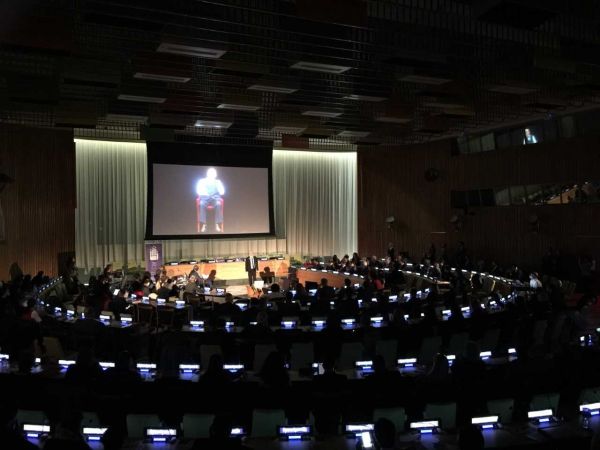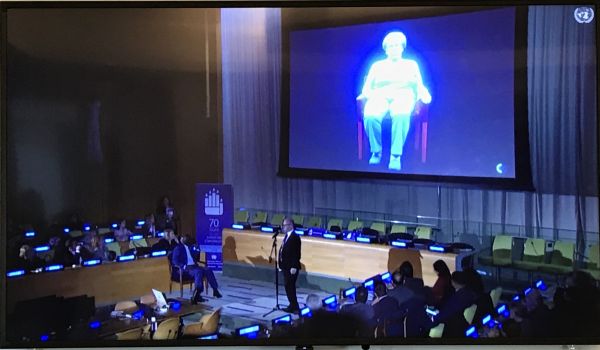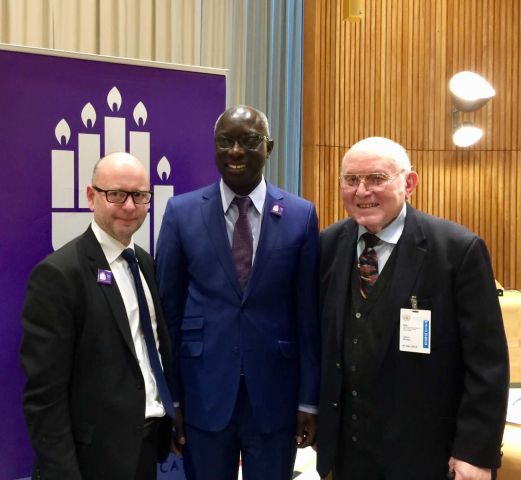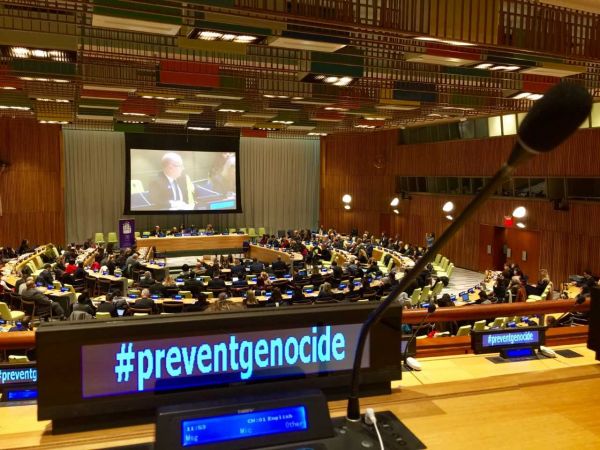USC Shoah Foundation plays major role at U.N. commemoration of genocide laws

USC Shoah Foundation Finci-Viterbi Executive Director Stephen Smith participated Friday at a special event at the United Nations marking the 70th anniversary of the adoption of the international law that defined genocide and held perpetrators accountable.
At the event, which commemorated the U.N. General Assembly’s passage of the Genocide Convention on Dec. 9, 1948, Smith discussed the role of technology in the prevention of genocide.
“The question before us today is how we use technology to uphold the values that are enshrined in the convention,” Smith said in his prepared remarks. “For certain it does not begin with high-performance computing and end with artificial intelligence. It begins with story, and ends in empathy.”
The observance, which included remarks from U.N. Secretary-General António Guterres, also featured a demonstration of the Institute’s Dimensions in Testimony interactive biography that enables people to ask questions and instantly receive pre-recorded responses from Holocaust survivors.
Survivors featured in the presentation were Pinchas Gutter, who was the only member of his family to survive the Majdanek concentration camp in Germany, and Eva Schloss, the last living relative of Anne Frank.

In response to a question from the audience about how to promote tolerance, Gutter’s pre-recording said:
“Accept ‘my culture is this, your culture is that.’ Your prayers to God -- you do it this way, I do it my way. I say Psalms, you read the Koran. Why can’t we live together? And in some places people do live together quite reasonably and tolerate each other. Why can’t the whole world do that?”
The demo was followed by an appearance from the real Pinchas Gutter, who after receiving a standing ovation from the crowd, participated in a Q-and-A with Adama Dieng, the U.N. Special-Adviser on the Prevention of Genocide. Gutter said he agreed to participate for one main reason: to help make the hate stop.
“When I see today things which kind of remind me of what happened in the times of the five years that I spent under Nazi rule, I mean it breaks my heart,” said Gutter, an 86-year-old resident of Toronto.
The purpose of the U.N. event was to raise awareness of the Genocide Convention and its role in combating and preventing genocide, to commemorate and honor its victims, and to reiterate the responsibility of each individual nation state to protect its citizens.

In his welcoming remarks, Guterres talked about the progress the world has made in the 70 years since the conventions were adopted. But he also listed places where genocide occurred since its adoption and urged the 45 countries that still haven’t signed on to do so.
“My generation believed that after the Holocaust, we would never see genocide again,” he said. “We were wrong. Modernity does not protect us from genocide. The digital age does not protect us from genocide. Nothing but our actions, based on our values and principles, can protect us from genocide.”
Guterres also lamented how, 70 after the Genocide Convention was adopted, "people are still being killed, raped, their homes torched, their lands confiscated, just because of who they are." He cited how the Yazidi people in Iraq were brutalized by the "violent extremists of Daesh" – also known as the Islamic State, or ISIS – and mentioned the plight of the Rohingya Muslims in Myanmar, "who have been systematically killed, tortured, raped and burnt alive, victims of what has rightly been called ethnic cleansing."
During his keynote remarks, Dieng – who served several terms as registrar of the International Criminal Tribunal in Rwanda in the aftermath of the 1994 genocide against the Tutsi – warned that while technology can be used to deter violence, it can also be used to incite it.
“Social media and the increasing access to the internet allows us to communicate instantly and globally, to share in real time what is happening to bring to the world attention issues of concern,” he said. “However, it has also been used as a tool to spread hate, including incitement of violence that has, in some instances, led to actual violence targeting populations or individuals on the basis of race, ethnicity, religion or other forms of identity.”
The event also included a panel of experts that included Smith and two others — Alison Smale, the U.N.’s Under-Secretary-General for Global Communication; and Agnès Callamard, Director of Columbia University Global Freedom of Expression — for a discussion on the goal of preventing genocide for the next 70 years.
Smale, a former journalist for the New York Times, discussed the U.N.’s use of new and traditional media when promoting universal values and fighting racism.
“On this day, when we commemorate the victims of the crime of genocide, and advocate for the prevention of this crime, it is important to remember that genocide usually starts with hate speech,” Smale said. “Words matter.”

Callamard, the U.N. Special Rapporteur on Extrajudicial Summary or Arbitrary Executions, noted that before the genocide that unfolded in 2017 against the Rohingya Muslims in Buddhist-majority Myanmar, Facebook had been repeatedly warned that its platform was being used to spread hate and propaganda.
“Social media companies cannot just be relying on third-party notification and reporting,” she said. “They must develop their own capacities to analyze and respond.”
Smith said technology can be a powerful tool in service of genocide prevention, but only when its use is coupled with humane values.
“When we have bad values and excellent technology, terrible things can happen,” he said. “And when we have humane values and excellent technology, remarkably good things can happen.”
Smith listed several core values that are essential to preventing genocide. They include creating inclusive, respectful societies (“genocide is not mass killing," he said, "it is exclusion taken to its logical conclusion”); instilling empathy in students and leaders alike; and developing trust.
“Genocide is a phenomenon of fear, expressed in violence,” Smith said. “The more we fear the less we trust, the more likely we are to harm. Narrative can build trust. Articulating respect is the first step to trust, without fear.”